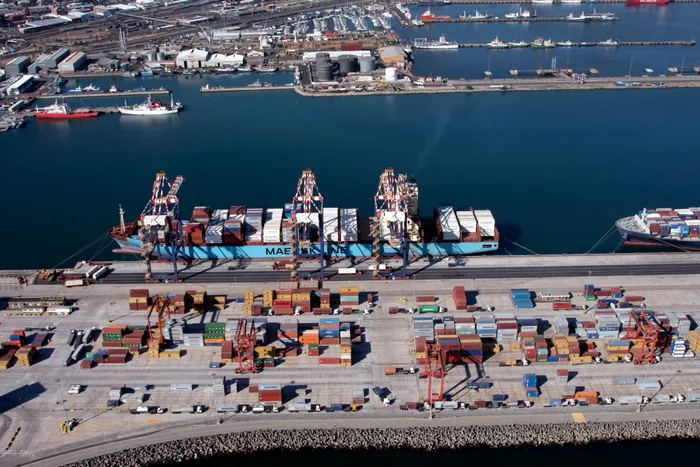
Minister of Finance Enoch Gondongwana said in his 2025 Medium Term Budget Policy Statement on Wednesday that in recent years, port efficiency is improving, with vessel waiting times down 75 per cent, while container handling is faster.
Image: Ian Landsberg/Independent Newspapers
Minister of Finance Enoch Godongwana has said that South Africa’s ports have seen significant efficiency gains in recent years.
This comes as vessel waiting times are down 75%, while container handling has become faster, a trend confirmed by industry experts.
Gondongwana last week noted that freight movement within the country had faced serious challenges, including congestion caused by a shift from rail to road transport
“This led to an overall decline in the volume of goods and exports transited. Reforms in freight logistics are gaining speed. Eleven private train operators now have slots on 41 routes across six corridors,” he said.
“Port efficiency is improving, with vessel waiting times down 75%, while container handling is faster.”
Gondongwana added that with Durban Pier 2 welcoming private operators, Transnet was expected to unlock R200 billion in investment over the next five years.
“These much-needed reforms in logistics will increase the volume of rail freight, reduce port congestion and improve the country’s economic performance.”
Independent maritime consultant Dave Watts on Friday said container terminal efficiency has improved in 2025 due to new equipment and stronger management focus.
“It is however coming off a low base with a lot further to be achieved. The citrus industry experienced a record year moving over 50 000 FEUs through Durban terminals, all of which performed exceptionally,” he said.
Watts highlighted that the arrival of new straddle carriers and the commissioning of four new ship-to-shore cranes at South Quay before the end of 2025 are expected to further boost efficiency.
“Current concerns are the widening and deepening of the North Quay which is to commence in 2026 at berth 205 and will certainly add constraints on container handling for the six years that the project is planned,” he said.
“The court’s decision around the PPS at DCT allows for International Container Terminal Services (ICTSI) to commence operations. Final confirmation of timing for the handover is expected shortly.”
Malcolm Hartwell, director and master mariner at Norton Rose Fulbright, pointed to Transnet’s improved statistics as evidence of tangible progress. Ship waiting times have dropped dramatically, container handling has improved, and cargo and truck waiting times have decreased.
Hartwell attributed these gains to government recognition of logistics’ critical role in an import- and export-driven economy, the formation of the logistics crisis committee, and targeted interventions.
“The overall reason for the improvement in efficiency is the government’s realisation as to how important logistics is to an import and export driven economy. This resulted in the logistics crisis committee being formed to advise the government on steps to be taken to improve the logistics sector and retain South Africa’s role as the gateway into Africa.”
Hartwell also said key factors driving efficiency include the appointment of Transnet CEO Michelle Philiips, a stronger governance framework, and a board supported by the government and free from prior allegations of nepotism and corruption.
“This has been enhanced by having a Transnet board that is supported by the government and, unlike previous boards, untainted by allegations of nepotism, corruption and incompetence,” he said.
“Transnet’s financial position has improved considerably in the last two years which has allowed it to focus on its business, investment and its partnership with the private sector.”
Hartwell added that reduced container ship waiting times also relieve port and road congestion, benefiting importers and exporters.
“There is no doubt that this is merely the start of Transnet and the ports’ turnaround. Our ports remain expensive and inefficient compared to global peers, but they are definitely moving in the right direction,” he said.
“Hopefully, the short-term benefits created by the improvement will allow Transnet to continue to aggressively reform its structures and systems and engage further in partnerships with the private sector.”
BUSINESS REPORT